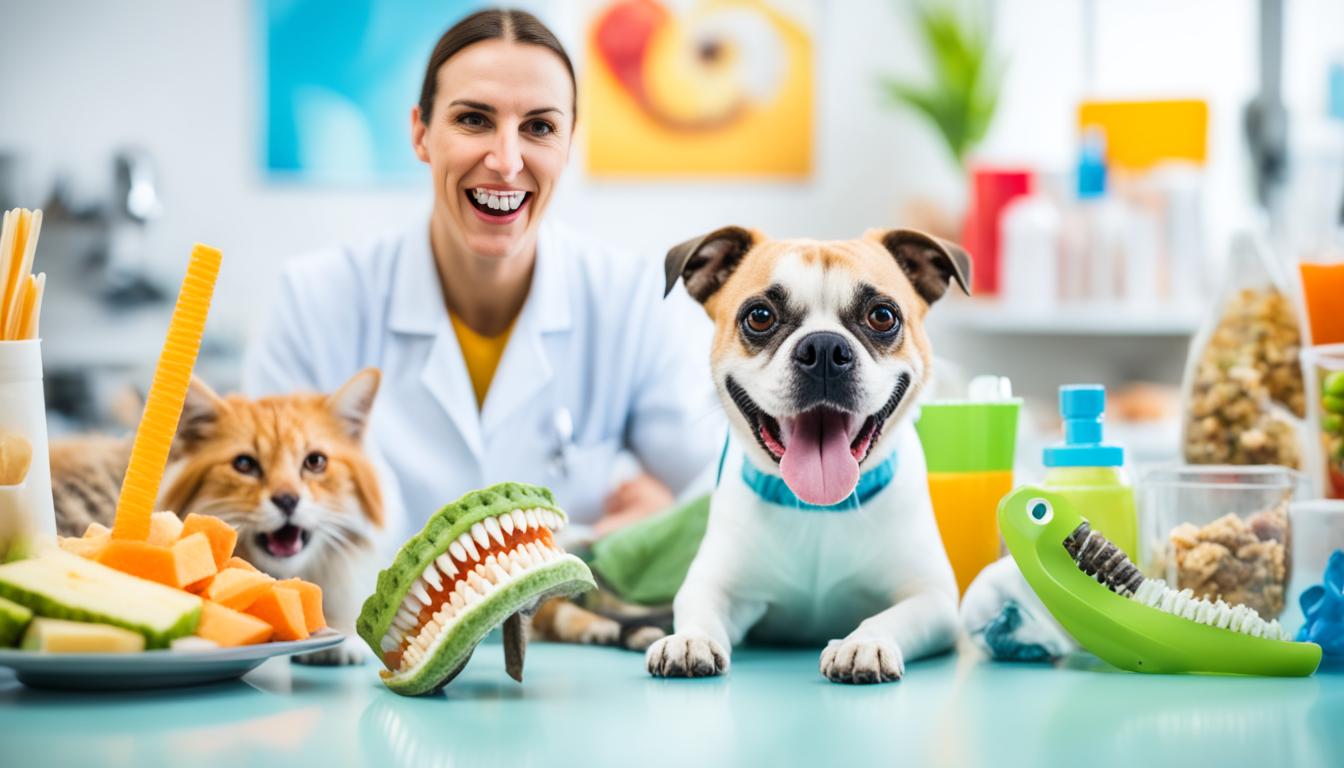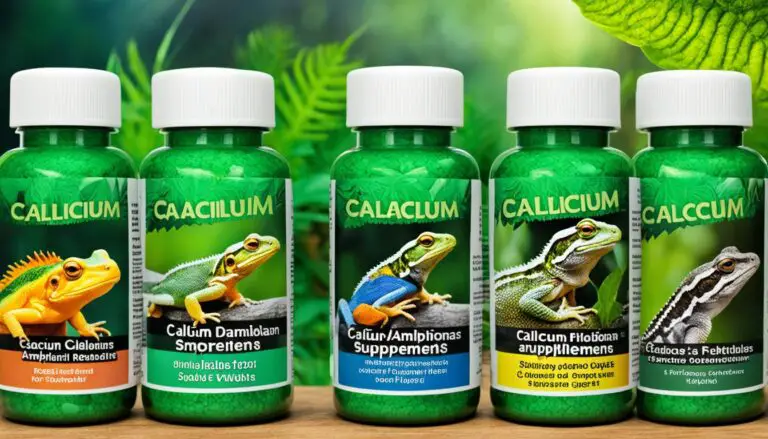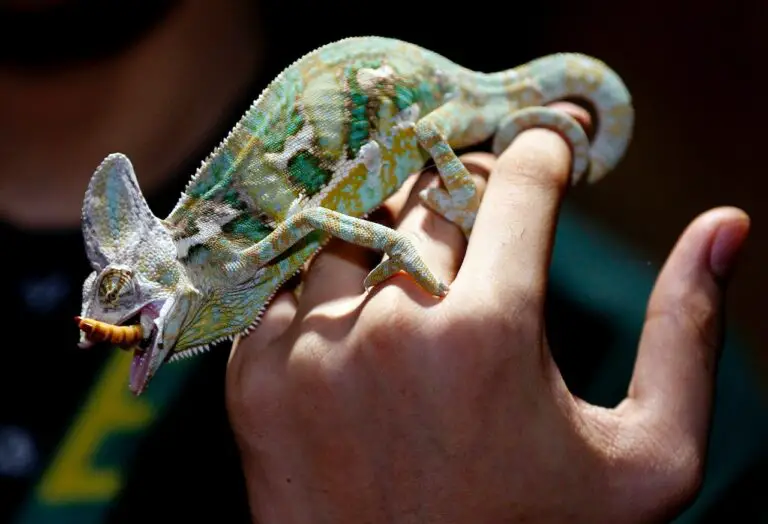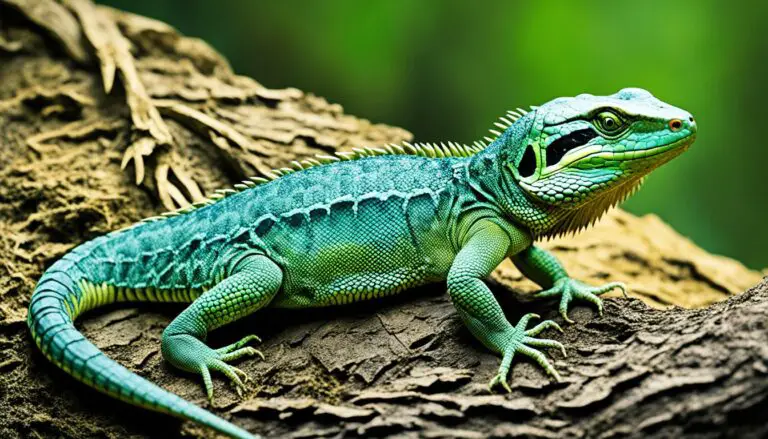Diet-Related Dental Care for Exotic Pets
Did you know many exotic pets face dental issues? These animals, like dogs and cats, might get tartar, gum problems, and even tooth infections. If not taken care of, these problems can even risk their lives.
It’s super important to look after your exotic pet’s teeth closely. This helps keep them healthy and happy for a long time.
Key Takeaways:
- Exotic pets, including ferrets, bearded dragon lizards, rabbits, rodents, and reptiles, require routine dental care.
- Regular oral examinations and dental cleanings are crucial for preventing dental issues in exotic pets.
- Ferrets are prone to dental problems like fractured teeth and gum inflammation and may need dental cleanings under anesthesia.
- Bearded dragon lizards are susceptible to plaque, tartar, and gum inflammation and require annual dental scaling.
- Rabbits and rodents have continuously growing teeth and need regular oral exams and treatments to prevent tooth impaction and other dental problems.
Ferret Dental Health
Ferrets are cute and lively pets that need good dental care. Just like many exotic pets, they often face dental problems. These include too much tartar and teeth that can break. Such issues can cause pain and swelling in their gums. Knowing how to care for your ferret’s teeth is key to keeping them healthy.
Exotic Pet Dental Specialists
For good oral health in your ferret, it’s vital to see a dental specialist. These experts are trained to handle the unique mouth needs of exotic pets like ferrets. They offer care that fits your ferret’s dental needs. This makes their help invaluable.
Exotic Pet Dental Care Tips
You can do a lot at home to help your ferret’s teeth. Here are some tips:
- Check your ferret’s mouth often for dental problems like tartar or red gums.
- Give your ferret chew toys meant to keep their teeth healthy.
- Feed them a diet that’s good for their teeth. This should include raw meat and bones.
- Avoid sugary and sticky foods that can harm their teeth.
- Use dental treats to help keep their mouth clean.
“Caring for your ferret’s teeth at home, along with getting professional cleanings, can prevent dental issues.”
Diet-Related Dental Issues in Exotic Companion Animals
The food your ferret eats is important for their dental health. Bad food choices can lead to dental problems. For example, the wrong diet can make tartar build up or cause swollen gums. Ferrets like to chew on lots of things. But they should have toys made to keep their teeth and gums healthy.
If your ferret shows signs of dental problems, like not wanting to eat or bad breath, see a dental expert. Taking action early can stop the problem from getting worse.

Ferret Dental Cleanings Under General Anesthesia
Some ferrets need dental cleanings under anesthesia. This is for everyone’s safety since it keeps the ferret still during their check-up. Anesthesia lets the vet look closely at the ferret’s mouth. They can then clean the teeth or do any repairs needed. For older ferrets, it’s especially important to do blood tests before the cleaning. This makes sure they are safe during the whole process.
Bearded Dragon Dental Health
Bearded dragon lizards need regular dental care like all exotic pets. Without it, they can get harmful bacteria, which causes plaque, tartar, and swollen gums. Their teeth are in their jawbones. This means they can get jawbone infections easily.
To avoid these issues, plan for your bearded dragon to have a dental check-up every year. They should be put under for this. It clears away any plaque, lowers gum problems, and stops jawbone infections. Before the procedure, make sure your pet is healthy enough with a blood test.
What bearded dragons eat is key for their dental health. Give them things to chew on like crickets, mealworms, and green veggies. Stay away from foods that are super soft or processed, as they hurt their teeth.
Always talk to experts for advice on your bearded dragon’s teeth. They give tips to keep your pet’s mouth healthy.

Common Dental Issues in Bearded Dragons
Not looking after your bearded dragon’s teeth can cause many problems. Some issues include:
- Periodontal Disease: When plaque and tartar build up, they can lead to swollen gums and periodontal disease.
- Mouth Rot: Bacterial infections cause mouth rot. It brings painful sores and makes eating hard.
- Bone Inflammation: Tooth infections can lead to bone inflammation. This really hurts the bearded dragon.
Seeing the dentist regularly and taking good care of their teeth can stop these problems from getting worse.
Rabbit and Rodent Dental Health
Rabbits and rodents, like guinea pigs, have teeth that never stop growing. They need special care for their teeth. In homes, they may not eat enough rough grass, which wears their teeth down. This leads to dental problems like sharp edges on teeth and tooth roots getting blocked.
It’s key to check these animals’ teeth often and fix problems as they come up. Experts in exotic pet dental care are very important for their health. They are specially trained to look after these small animals.
During a check-up, the doctor looks at the animal’s mouth. They check for signs like teeth that aren’t wearing evenly. They might use X-rays to see if there are hidden dental issues.
If the vet finds any problems, they’ll offer treatment. This might involve smoothing out sharp areas on the teeth. They could also remove teeth that are loose or have an infection. Medicine might be needed too, to lessen pain or stop infection.
Exotic pet dental care tips:
- Feed them food that keeps their teeth naturally worn, like hay and chew toys.
- Always make sure they have fresh water, which is also good for their teeth.
- Watch how they eat and look for signs that their teeth hurt, like not eating much or drooling.
- Don’t forget the dentist! Regular teeth checks by an expert can prevent bigger problems.
Along with seeing a vet, taking care of your pet’s teeth at home is a must. Check their teeth and gums often and clean off any junk gently. Remember, if your pet needs more than basic care, a vet should handle it.
“Regular oral checks and treatments are key for these animals’ dental health.”
– Dr. Emma Johnson, Exotic Pet Dental Specialist
Here’s a table to show what dental issues rabbits and rodents might have and how they can be treated:
| Dental Issue | Treatment |
|---|---|
| Sharp Spurs | Filing down the spurs to prevent further damage |
| Loose or Infected Teeth | Extraction of affected teeth |
| Periodontal Disease | Deep cleaning, antibiotics, pain management |
| Tooth Root Impaction | Extraction of impacted tooth roots |
Looking after your pet’s teeth and going to the vet regularly will keep them happy and healthy.

Herbivore Dental Problems
Rabbits, chinchillas, and guinea pigs have special dental needs. The issue is their teeth keep growing. This is needed for their fibrous diet. But, it can be a problem if not managed well.
Keeping their teeth even is vital. Their teeth must wear down correctly. Otherwise, they might have overgrown or sharp teeth. This can make eating hard and cause pain.
Bad genes, lack of vitamins, and selective breeding lead to dental issues. It’s important to give them the right diet. This supports their dental health.
To stop overgrown teeth, herbivores must eat plenty of roughage. This includes hay and fresh greens.
Regular exams by a vet are important. They can find and treat dental problems early. This keeps the pet’s teeth healthy.
Diet Impact on Dental Health in Herbivores
A good diet is vital for herbivores’ dental health. It wears down teeth naturally. This prevents overgrowth and sharp edges. It also prevents tooth decay and gum disease.
Feeding herbivores the right food is essential. This includes fresh hay, greens, and veggies. These foods are rich in nutrients. They help keep teeth in top shape.
Avoid sugary snacks, starchy veggies, and too much fruit. These can harm their teeth. Talk to a vet for the best diet advice for your pet.

Caring for an herbivore’s teeth and diet is crucial. Knowing their special dental needs and giving them the right food ensures a happy and healthy life.
Dental Treatment Options for Exotic Pets
Exotic pets have unique dental needs which makes their care special. Some treatments require the animal to be asleep to get the best care.
Common dental treatments for these pets are important:
- Flushing the oral cavity: This step gets rid of dirt and germs to keep the mouth healthy.
- Debridement: It’s about cleaning out diseased tissues from the teeth and gums.
- Dental scaling: This method cleans the teeth by removing hard plaque and tartar.
- Extractions: Badly damaged teeth might need to be pulled out to avoid more problems.
After dental work, special care is given to these pets. This is to make sure they heal well. It includes:
- Topical antimicrobial therapy: Using special solutions to fight germs.
- Systemic antibiotics: Medicines to stop or treat infections.
- Pain relief medication: Drugs that help the pets feel better and lessen pain.
- Nutritional support: Feeding a balanced diet that keeps the mouth and body healthy.
When it’s time to take out a tooth, vets choose the best way based on the pet’s size and needs. This ensures a good outcome for the pet’s teeth.
It’s best to find a vet who knows about exotic pet teeth. They can give the right care. With their help, pet owners can make sure their exotic pets have great dental health.
Preventing and Recognizing Dental Issues in Exotic Pets
Keeping exotic pets’ teeth healthy is key to their well-being. This involves feeding them right and checking their teeth often. These steps help lower the chance of dental problems.
Signs of dental trouble in exotic pets include:
- Discharge from the nose or eyes
- Changes in fecal pellets
- Teeth grinding
- Excessive drooling
- Decreased appetite
Spotting dental issues early is crucial. Pet owners should watch for these signs. If their pet shows any, they should see a vet right away.
Getting regular dental check-ups from an expert in exotic pets is also important. Vets can examine the mouth, teeth, and gums for any problems. They check for tartar or infections and recommend how to stop problems before they start.
Sample Quote:
“Preventing dental problems in exotic pets requires a proactive approach that includes proper diet and regular veterinary check-ups. By prioritizing oral health, pet owners can ensure their beloved companions lead a happy, healthy life.” – Dr. Emily Thompson, Exotic Pet Dentistry Specialist
Diet is especially significant for healthy teeth in exotic pets. Foods like hay and leafy greens are good because they wear down teeth naturally. Sticky and sugary foods should be avoided for good oral hygiene.
To sum it up, preventing dental issues in exotic pets needs proper diet, check-ups, and quick action. Owners taking these steps help their pets have great oral health and a better life.
| Preventive Measures | Benefits |
|---|---|
| Schedule regular oral examinations | Detect dental issues early |
| Provide a diet rich in roughage | Encourage natural tooth wear |
| Avoid sugary treats and sticky foods | Reduce the risk of dental decay |
| Prompt veterinary attention for dental symptoms | Prevent further complications |
Importance of Anesthesia for Exotic Pet Dental Exams
Anesthesia is crucial for full dental checks on exotic pets. It keeps them still, letting vets check their teeth and mouth very well. It makes everything not just accurate but also kinder for the pet.
Specialists always suggest using anesthesia for complex dental work. This might include fixing teeth that are too long, taking out bad teeth, and treating infections. Doing these without anesthesia could be very hard because exotic pets tend to struggle or run away. So, anesthesia is key for the best dental care.
When pets are under anesthesia, a vet team watches them very closely. They make sure the pet is safe throughout. This close attention lets vets look deeply into the pet’s mouth. They can find and treat very specific dental problems fast.
Under anesthesia, vets have a clear view of the pet’s mouth. This means they can spot early signs of trouble, like gum disease or teeth that need fixing. They can check every part, even the spots that are hard to see. It’s the best way to look for issues before they get serious.
Once the vet finds a dental issue, they can fix it right away. They might clean the teeth or take out a bad tooth. They can do this work very well because the pet isn’t moving. This ensures the steps taken for the pet’s dental health are done right.
So, anesthesia is key for caring for exotic pets’ teeth well. It allows for detailed checks and treatments that make pets’ teeth and mouths healthier. This way, exotic pets can have the best dental care possible.
Conclusion
Dental care is key for exotic pets’ health, just like for cats and dogs. These special pets need regular dental checks and care. This keeps their teeth and mouth in good shape. Working with experts in exotic pets’ dental health is crucial.
It’s vital to have regular dental checks for your exotic pet. Also, they need a proper diet and oral care. This helps avoid common dental problems, like tartar and infected teeth. Specialists in exotic pet dental health can find and fix these problems. This keeps exotic pets happy and pain-free.
Taking care of your exotic pet’s teeth helps their overall health. Besides a check-up with the vet and a good diet, dental care is essential. Together, we can make sure these special animals have healthy teeth for life.
FAQ
Why is dental care important for exotic pets?
What are some common dental issues in ferrets?
What dental care do ferrets need?
How can I care for my bearded dragon’s dental health?
What are the unique dental needs of rabbits and rodents?
How can I prevent dental problems in herbivorous pets?
What dental treatment options are available for exotic pets?
How can I prevent and recognize dental issues in exotic pets?
Why is anesthesia important for exotic pet dental exams?
Why is dental care important for exotic pets?
Source Links
- https://birdsandexotics.com/dental-care/
- https://www.birdexoticsvet.com/post/herbivore-pet-dental-health
- https://avianexoticsvet.com/blog/a-guide-to-dental-care-for-exotic-pets/
Peter Stones is the founder of Exotic Pets Place, the leading online resource for exotic pet care information.
With over 10 years of hands-on exotic pet ownership experience, he is deeply passionate about sharing his expertise to help others properly care for their unusual pets.
When he's not writing extensively researched articles or connecting with fellow exotic pet enthusiasts worldwide, you can find Peter at home tending to his own beloved menagerie of exotic animals.







